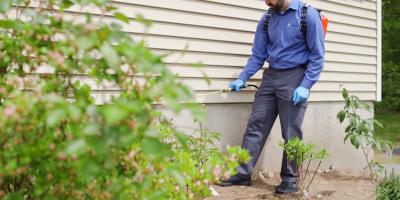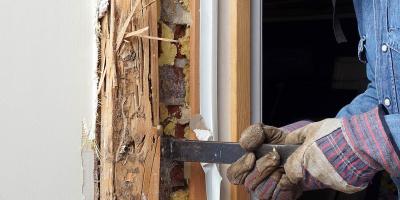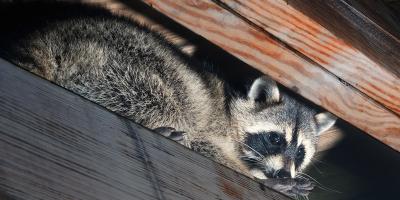Curb Appeal: Why some ant species find your home very attractive

Ants are perhaps the most common insect pests the average person will encounter. Nationwide, ants are considered by pest control professionals to be the most difficult pest to control. Finally, they are widespread, with native species on six of the seven continents and many invasive pest ants introduced to new areas by human activities. Finally, they are numerous – some colonies can contain millions of individual ants! – that they can be considered some of the most successful creatures in the world. While they serve an important role in the ecosystem, most of us will at some point experience what a nuisance they are when they enter our homes. Below, you’ll find common reasons ants are attracted to structures and what you can do to reduce its appeal to invading ants:
The ‘Honey-Do’ Top 10 List:
- Honeydew Producers – Did you know that ants can take advantage of other insects, using them as livestock? Aphids and other plant-attacking pests produce a sugary substance known as honeydew. Honeydew is an extremely popular meal for ants – so much so that ants have even been observed caring for aphids! In addition to preventing the damage aphids can do to your plants, causing stunted growth, leaf curling, and discoloration, keeping your plants aphid-free will deny ants a valuable source of food on your property.
- Landscaping – The landscape around your home can provide foraging ants with valuable opportunities to invade your home. Overgrown plants or tree limbs touching your foundation, siding, or roof can provide ants with bridges they can use to get inside your home – they will take advantage of any opportunity they can find to get inside! Keeping bushes, trees, and vines properly trimmed and away from the home eliminates the opportunity for ants to use them to sneak inside.
- Roof Drainage Systems – Collected dirt, leaves, pine needles and the like can create a great place for ants to live on your home. This wet debris is certainly unpleasant for us to clean, but ants love the moisture and concealment it can provide the colony, and once they’ve chosen to nest in your home’s roof drainage system, it’s only a matter of time before they make their way into your home. Regular cleaning can deny ants a chance to make their home and help to keep yours safe!
- Leaks – A leak in your home can be a huge problem! In addition to the peril of water damage, leaky plumbing also makes your home a much more attractive place for moisture-loving ants. Carpenter ants – the pest responsible for more property damage in New England than any other – will quickly take advantage of the opportunity to excavate their nests in moist wood. Quickly repairing any leaks can help protect your home by discouraging ants from making it theirs.
- Leaf Litter – Ants can make beneficial use of the extensive leaf litter that can build up around homes during the Autumn season. Piles of leaf litter trap moisture and provide a concealed space, creating conditions that ants love. You can help keep ants away from your home by ensuring leaf litter doesn’t pile up against your foundation and by promptly removing it from your property.
- Gardens – Your home garden can inadvertently benefit ants as much as it benefits you. Just like other plants, those in your garden can be attacked by honeydew producing insects. While ants generally won’t attack growing fruits or vegetables, if they fall, they can quickly become a source of food for ants. Raised garden beds – especially those in contact with the soil – can provide great shelter for a nest. Keeping your garden healthy, promptly collecting any fallen produce, and locating garden beds away from your foundation can reduce the chance of attracting ants to your home.
- Wood Storage – Stored wood can provide ants with ample opportunity to form a nest. Wood stored directly on the ground or up against your foundation traps moisture and provides a sheltered place. Storing wood on an elevated rack, away from your home, will help prevent ants from using it a location from which to attack your home. When taking this precaution, it’s still possible for ants to hitch a ride into your home on firewood, so it’s advisable to only bring enough to burn for a day or two at a time inside, and to use wood in the order of “first in, first out”.
- Exterior Clutter – Clutter around your home can also provide shelter for ants, many of which like to make their nests under objects that can provide them shelter – especially bricks, paving stones, concrete slabs and the like. Reducing clutter, storing items off the ground when possible, and occasionally overturning or moving things can help keep ants from using them as a safe space.
- Pet Foods – Food for dogs, cats, and even hummingbird birds can become a major attractor for ants. This can be prevented by promptly removing food after your pets have been fed and cleaning up any spillage. Hummingbird feeders can be protected by applying a coat of petroleum jelly to the chain, rope, bracket or other point of attachment.
- Recycling – Recycled food and beverage containers can supply a feast for ants! They will be particularly attracted to the sweet syrupy residue in empty soda cans, juice bottles, and the like. You can avoid attracting ants to this buffet by keeping your recycling in a receptacle with a tight-fitting lid.
Bottom Line:
The control of household pests, like ants, requires expertise, experience, and attention to detail. There is no silver bullet or magic pill – even highly effective ant barrier treatments must be used wisely and in conjunction with other IPM (Integrated Pest Management) techniques. JP Pest Services’ highly trained Service Professionals have the skill and training to apply decisive control strategies to whatever pest scenario that disturbs you. JP Pest Services is ready to prevent ants from invading your home or business!



